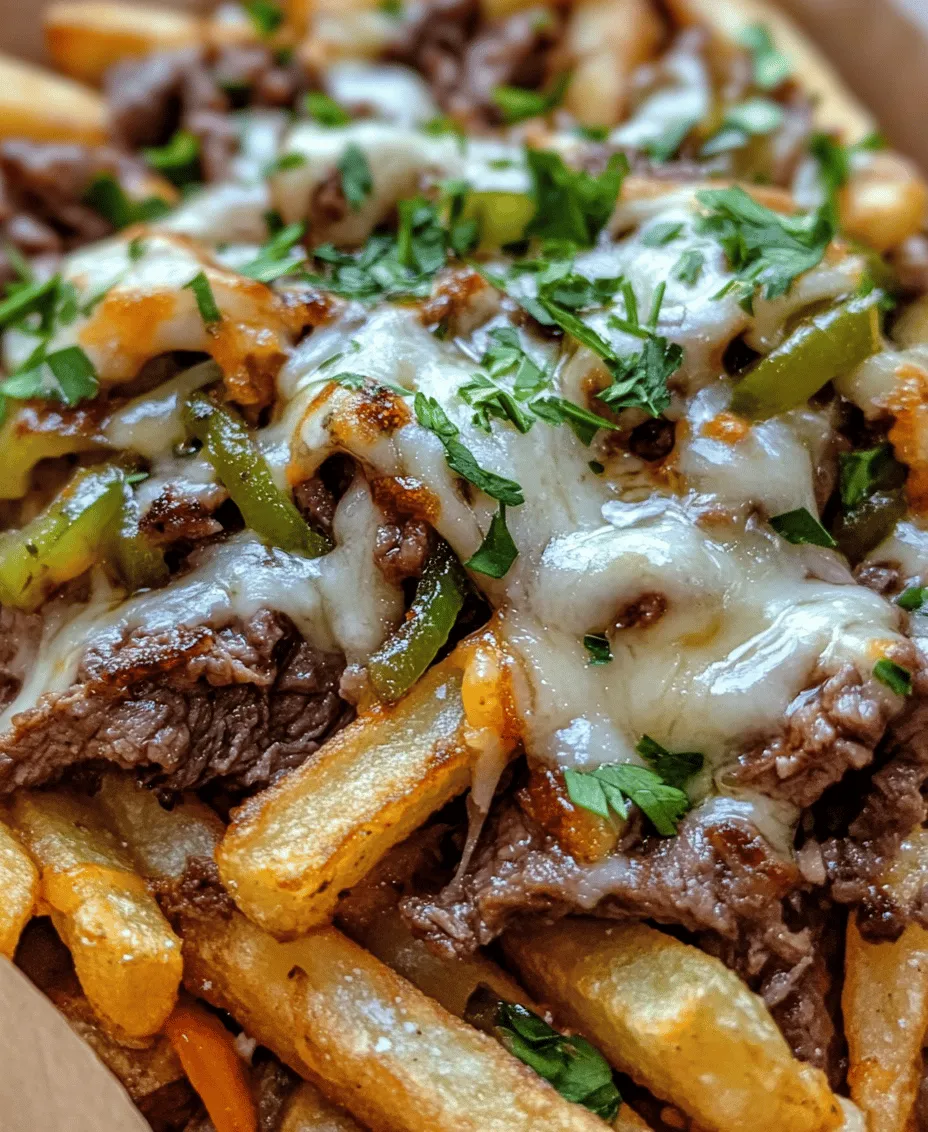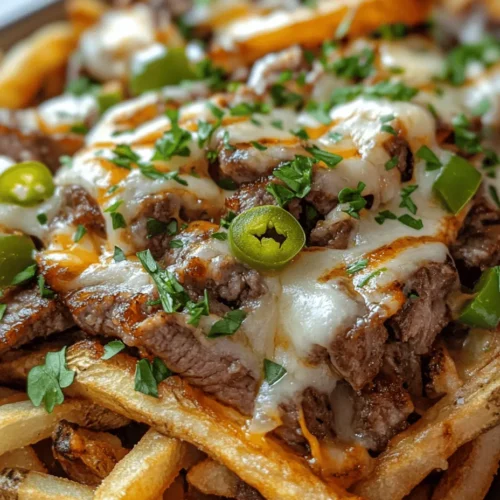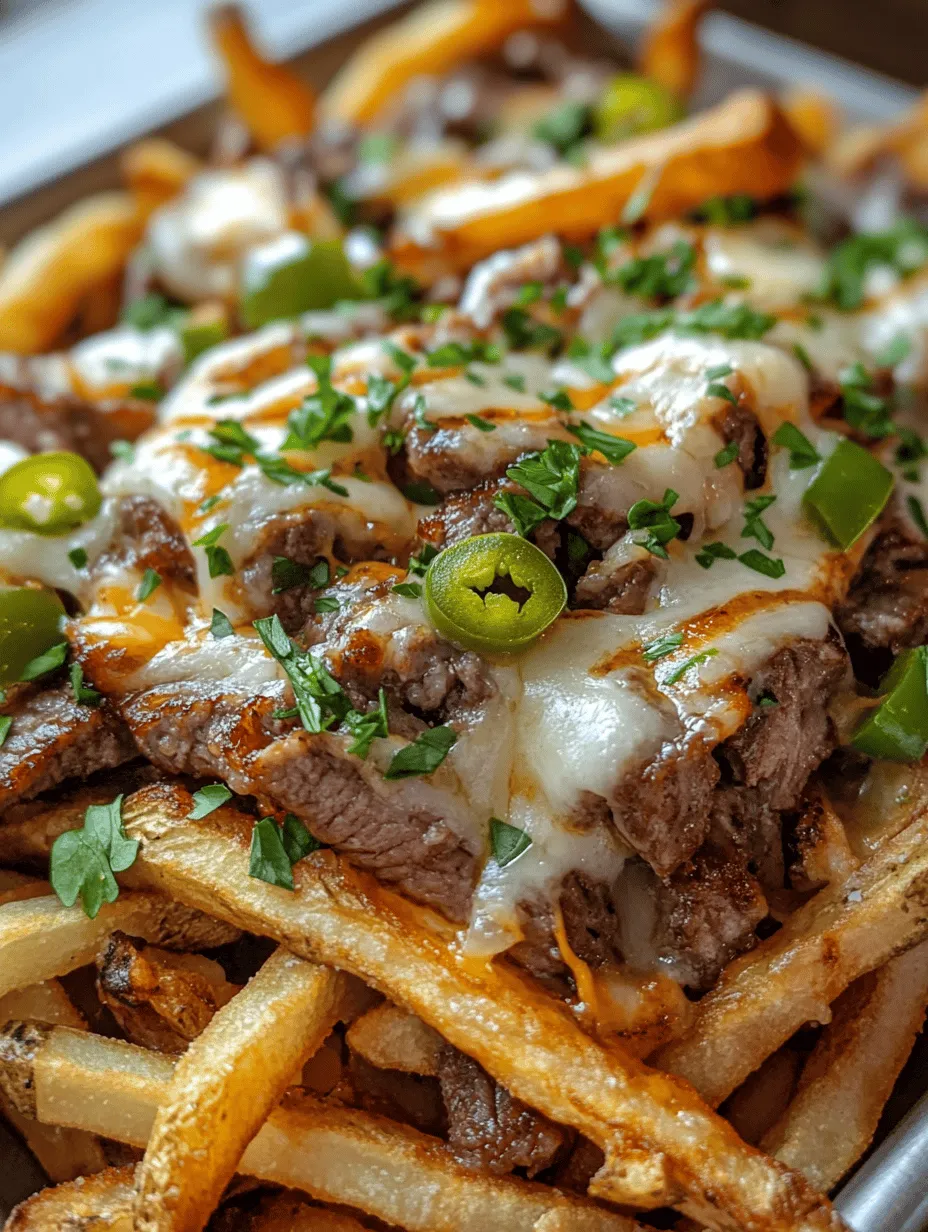In the realm of comfort food, few dishes can compete with the irresistible allure of Philly Steak Cheese Fries. This decadent dish perfectly marries the classic flavors of a Philly cheesesteak with the satisfying crunch of crispy fries, resulting in a culinary experience that is both indulgent and delightful. Whether you’re hosting a gathering, celebrating game day, or simply looking to treat yourself after a long week, this recipe is a winning choice that promises to satiate your cravings and impress your guests.
The origins of the Philly cheesesteak trace back to Philadelphia, where it became a beloved street food staple. Over time, this iconic sandwich has inspired countless variations, including the popular dish of Philly Steak Cheese Fries. Imagine crispy, golden fries topped generously with savory ribeye steak, sautéed onions, and bell peppers, all smothered in a melty cheese sauce. This dish captures the essence of the classic cheesesteak while adding a fun twist, making it the perfect meal for sharing or even as a solo indulgence.
In this article, we will guide you through the detailed process of crafting the ultimate Philly Steak Cheese Fries. From understanding the essential ingredients to preparing the fries and cooking the steak and vegetables, we aim to elevate your cooking experience and ensure that your dish turns out perfectly every time. So, roll up your sleeves and get ready to dive into the delicious world of Philly Steak Cheese Fries!
Understanding the Ingredients
Overview of Russet Potatoes: Why They are Ideal for Fries
The foundation of any great fry dish begins with the potatoes, and for Philly Steak Cheese Fries, russet potatoes are the clear choice. Known for their high starch content and low moisture, russets produce crispy outsides while maintaining fluffy interiors. This unique texture is essential for fries that can hold up against the rich toppings without becoming soggy. When selecting russet potatoes, look for firm, unblemished specimens. The size of the potatoes can vary, but medium to large ones will yield a generous batch of fries.
The Role of Ribeye Steak in Flavor and Texture
Next up is the star of the show: the ribeye steak. Renowned for its rich marbling and tender texture, ribeye steak adds a depth of flavor that is unmatched in other cuts. When cooked properly, ribeye becomes melt-in-your-mouth tender, making it the perfect meat to accompany the crispy fries. For this recipe, aim for high-quality ribeye, preferably with some marbling, as this fat enhances the overall flavor and juiciness of the dish. When slicing the steak, it’s crucial to cut against the grain to ensure tenderness in each bite.
Choosing the Right Cheese: Provolone and Mozzarella Explained
The cheese topping is what ties the entire dish together, and for Philly Steak Cheese Fries, both provolone and mozzarella are excellent choices. Provolone is a traditional option often used in cheesesteaks, known for its tangy flavor and melty goodness. Mozzarella, on the other hand, offers a mild taste and an appealing stretch when melted. Many cooks opt to use a combination of both cheeses to achieve a perfect blend of flavors and textures. Regardless of your choice, ensuring that the cheese is freshly grated will provide the best melting results.
The Importance of Fresh Vegetables: Onions and Bell Peppers
Sautéed onions and bell peppers add a delightful sweetness and crunch to the dish, complementing the savory flavors of the steak. For this recipe, yellow or white onions work best due to their balanced sweetness when caramelized. Bell peppers, particularly red and green ones, provide a pop of color and a fresh, crisp texture. When preparing these vegetables, aim for even slices to ensure they cook uniformly. Sautéing them until they are tender and slightly caramelized will enhance their natural flavors and elevate the overall taste of your dish.
Seasoning Essentials: Garlic Powder, Onion Powder, Salt, and Pepper
To enhance the flavors of your Philly Steak Cheese Fries, a simple yet effective seasoning blend is essential. Basic seasonings like garlic powder, onion powder, salt, and fresh black pepper will provide a depth of flavor without overwhelming the dish. These spices should be used liberally on both the fries and the steak to ensure every component is well-seasoned and bursting with flavor. Feel free to adjust the quantities to suit your personal taste preferences.
Optional Add-Ins for Customization: Jalapeños and More
While the classic version of Philly Steak Cheese Fries is undeniably delicious, don’t hesitate to customize it to suit your preferences. For those who enjoy a little heat, adding sliced jalapeños or banana peppers can elevate the flavor profile and add a spicy kick. Additionally, consider incorporating mushrooms for an earthy element or even crispy bacon bits for an extra layer of indulgence. The beauty of this dish lies in its versatility, so feel free to get creative with your toppings!
Preparation of the Fries
Selecting and Preparing Russet Potatoes
Once you have gathered your ingredients, it’s time to focus on the fries, which serve as the base of this mouthwatering dish. Begin by selecting your russet potatoes, opting for those that are firm and free of blemishes. Wash them thoroughly under running water to remove any dirt or debris, and then peel them if desired. Some prefer to leave the skins on for added texture and nutrition, so this step is entirely up to you.
Techniques for Cutting Fries: Achieving the Right Thickness
Next, it’s crucial to cut the potatoes into fries that are uniform in size. This ensures even cooking and crispiness. Start by cutting the potato in half lengthwise, then lay each half flat on the cutting board. Slice the halves into planks, and then cut those planks into thin strips, about 1/4-inch thick. If you prefer thicker fries, you can adjust your cuts accordingly, but keep in mind that thicker fries may require a longer cooking time to achieve that perfect crisp.
The Role of Olive Oil in Achieving Crispy Fries
Once your fries are cut, the next step is to coat them in olive oil, which plays a vital role in achieving that desired crispy texture. Place the cut fries into a large bowl and drizzle with a generous amount of high-quality olive oil. Toss the fries until they are evenly coated, ensuring that each piece is covered in oil. This not only helps with crisping but also adds an extra layer of flavor to the fries.
Seasoning Fries: Balancing Flavors with Garlic and Onion Powder
After coating your fries in olive oil, it’s time to season them. Sprinkle garlic powder, onion powder, salt, and black pepper over the fries, then toss them again to ensure even distribution of the seasonings. This step is crucial, as the seasoning will enhance the flavor of the fries and complement the more robust toppings to come. If you’re feeling adventurous, feel free to experiment with other seasonings like paprika, cayenne, or even your favorite spice blend.
Baking Techniques: Temperature and Timing for Optimal Crispiness
To achieve the ultimate crispy fries, preheat your oven to 425°F (220°C). Spread the seasoned fries in a single layer on a baking sheet lined with parchment paper, ensuring they are not overcrowded – this allows for proper airflow and crisping. Bake the fries for 25-30 minutes, flipping them halfway through to ensure even cooking. Keep an eye on them during the last few minutes to avoid burning, and remove them from the oven when they are golden brown and crispy on the outside.
Cooking the Steak and Vegetables
Choosing the Right Cooking Equipment: Skillets and Heat Sources
While the fries are baking to perfection, it’s time to prepare the ribeye steak and vegetables that will top your delicious fries. Choosing the right cooking equipment is essential for achieving maximum flavor. A large cast-iron skillet or a heavy-bottomed pan works best for this task, as it can retain heat evenly and provide a beautiful sear on the steak. Make sure your skillet is preheated over medium-high heat before adding any ingredients.
Preparing the Ribeye Steak: Tips for Slicing Thinly
Before cooking the steak, it’s important to prepare it properly. Start by removing the ribeye from the fridge and letting it rest at room temperature for about 20-30 minutes. This allows for even cooking throughout the steak. When ready to slice, use a sharp knife to cut the ribeye against the grain into thin strips, about 1/4-inch thick. Thin slices are key for quick cooking and tenderness, ensuring that each bite is flavorful and easy to enjoy.
As you embark on your culinary adventure of creating Philly Steak Cheese Fries, these initial steps set the stage for a fantastic dish. From selecting the right ingredients to preparing the fries and steak, each element plays a crucial role in achieving the perfect balance of flavors and textures. Stay tuned as we dive deeper into the cooking process and finalize this mouthwatering comfort food masterpiece!

Cooking Method: Achieving Perfectly Cooked Steak in Minutes
To create the ultimate Philly Steak Cheese Fries, the foundation lies in perfectly cooked steak. Using thinly sliced beef, such as ribeye or sirloin, ensures quick cooking while retaining juiciness. Start by preheating a cast-iron skillet or a non-stick frying pan over high heat. It’s crucial to get the pan hot enough to sear the meat, which will lock in moisture and flavor.
Preparation Tip: For easier slicing, freeze the steak for about 30-60 minutes beforehand. This firms it up, allowing for thinner, more even slices. Once your pan is hot, add a tablespoon of olive oil. Sear the steak slices quickly for about 1-2 minutes on each side, ensuring they are still slightly pink in the center. This quick cooking method keeps the beef tender and juicy.
Sautéing Onions and Bell Peppers: Techniques for Caramelization
Next, it’s time to add depth of flavor with sautéed onions and bell peppers. Start by slicing one medium onion and one bell pepper (red or green, depending on your preference) into thin strips. In the same skillet you used for the steak, add another tablespoon of olive oil, along with your sliced vegetables.
Cook the onions and bell peppers over medium heat, stirring frequently. To achieve caramelization, allow the vegetables to cook slowly. This process typically takes about 8-10 minutes. You’ll know they’re ready when they turn a lovely golden brown and become tender. For added sweetness, you can sprinkle a pinch of sugar during cooking, which enhances the caramelization process.
Balancing Flavors: Seasoning the Vegetables to Complement the Steak
As the vegetables begin to caramelize, it’s essential to season them to complement the rich flavor of the steak. A combination of salt, pepper, and garlic powder works beautifully. For a touch of heat, consider adding crushed red pepper flakes. Season to your taste preferences, remembering that the flavors will deepen as they cook, so it’s better to start with a little and adjust as necessary.
Combining Ingredients for the Ultimate Flavor Experience
Layering for Flavor and Presentation
Once your steak and vegetables are perfectly cooked, it’s time to bring everything together. Start by layering your crispy fries on a large baking sheet or oven-safe platter. Follow this with a generous layer of the sautéed steak and vegetable mixture. The key to an outstanding flavor experience is to ensure every fry gets a taste of the savory steak and sweet vegetables.
The Importance of Timing: Combining Ingredients at the Right Moment
Timing is crucial in this step. Combine the steak and vegetables while they are still warm; this will help meld the flavors together. Pour the mixture evenly over the fries, making sure to distribute it well.
Layering Technique: Ensuring Every Bite is Flavorful
To ensure that every bite is packed with flavor, consider doing a second layer of fries, followed by the remaining steak and vegetable mixture. This double layering ensures that everyone gets a taste of the delicious toppings, no matter where they dig in.
Cheese Melting Methods: Achieving the Perfect Gooey Texture
Next comes the star of the dish: the cheese. Traditional Philly cheesesteaks use provolone or Cheez Whiz, but you can opt for your favorite melting cheese. Mozzarella or a blend of cheeses, including sharp cheddar, can also work well.
Melting Technique: For a gooey texture, sprinkle an ample amount of cheese over the layered ingredients. To achieve that perfect melt, you can either place the assembled fries under a broiler for 2-3 minutes until the cheese is bubbly and golden or cover the dish with aluminum foil and bake it at 375°F (190°C) for about 10 minutes. The latter method can help the cheese melt without burning.
Final Baking: Ensuring the Cheese is Melted and Bubbly
After melting the cheese, remove the dish from the oven. It should look inviting with bubbling cheese and a delightful aroma wafting through your kitchen. Allow it to cool for a minute or two before serving, as this will help the cheese set slightly and make it easier to serve.
Serving Suggestions
Making Your Philly Steak Cheese Fries Stand Out
Plating Techniques: Presenting Your Dish Beautifully
Presentation is key when serving your Philly Steak Cheese Fries. Use a large platter to showcase the dish. Consider using parchment paper on the platter for a rustic touch, or serve individual portions in shallow bowls, which can make it feel more special.
Garnishing Tips: Fresh Parsley and Optional Jalapeños
To elevate the dish visually and flavor-wise, garnish with freshly chopped parsley. This adds a pop of color and freshness. For those who enjoy a kick, sliced jalapeños can be sprinkled on top, either fresh or pickled, providing an extra layer of flavor.
Pairing Ideas: Complementary Dishes and Beverages
When serving Philly Steak Cheese Fries, think about complementary sides and drinks. A simple side salad with a light vinaigrette can balance the richness of the fries. For beverages, consider pairing with a cold lager or a crisp white wine, which can cut through the heaviness of the dish beautifully.
Nutritional Insights
Understanding the Nutritional Profile of Your Dish
A Breakdown of Calories and Macronutrients
As indulgent as Philly Steak Cheese Fries are, it’s important to be aware of their nutritional content. A typical serving can range from 600-800 calories, depending on portion size and the ingredients used. The dish is rich in protein from the steak and cheese, while the fries provide carbohydrates.
Potential Health Benefits of Ingredients Used
Despite being a comfort food, there are potential health benefits in this dish. Lean cuts of beef provide essential nutrients like iron and zinc. Bell peppers and onions add vitamins and fiber, boosting the overall nutritional value.
Suggestions for Making Healthier Swaps
To lighten the dish, consider using sweet potato fries instead of traditional fries for added nutrients and fiber. You can also opt for lower-fat cheese options or use less cheese overall while still enjoying that cheesy flavor.
Conclusion
Philly Steak Cheese Fries are more than just a dish; they embody comfort, indulgence, and satisfaction in every bite. With their rich combination of flavors and textures, they bring a taste of Philadelphia straight to your kitchen. By following this detailed guide, you can create a mouthwatering meal that not only satisfies cravings but also impresses your guests. Whether you choose to enjoy them as a main dish or a hearty snack, this recipe is sure to become a beloved favorite in your home, proving that comfort food can indeed be a culinary masterpiece. So gather your ingredients, invite your friends over, and dive into this delicious dish that’s as fun to make as it is to eat!



